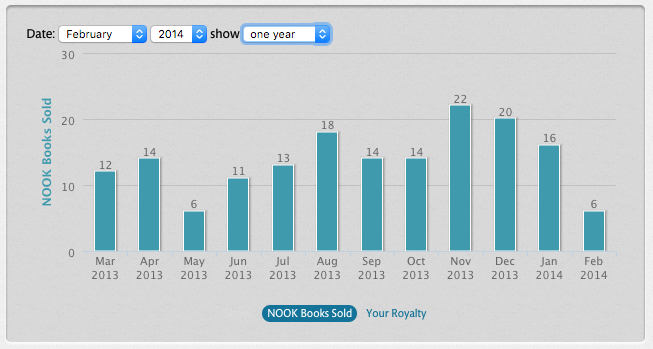I’ve lamented the state of competition in the ebook platform wars in the past.
Take Apple, which had so much going for it 3 or 4 years ago compared to Amazon, with a vastly superior e-reader (the iPad using iBooks) and sales that regularly topped $200 per month for my In 30 Minutes series of how-to guides. Apple’s hardware/software advantage did not last. Amazon eventually closed the hardware gap with the Kindle Fire, and continued to make improvements to the Kindle software and ordering processes. Meanwhile, Apple’s bloated iTunes/iBookstore has continued to frustrate users attempting to buy or review books, contributing to a stagnant sales picture. So where did Apple place its platform improvement efforts while Amazon was catching up, you ask? Creating a superb closed-garden authoring tool (see my iBooks Author review here) which has done little for sales in the iBookstore and makes it impossible to export the efforts to any other channel.
Then there is Google Play Books and the partner center for authors and publishers. Google is the only other deep-pocketed company out there that could ever hope to compete with Amazon in the ebook space, but it too has dropped the ball with its marketplace. I have been selling ebooks there for 3 years, and sales have never been good. But there are a host of other problems that stymie content producers and make it difficult to consider it a serious contender to Amazon KDP.
Google Play Books review: What’s wrong with Google Play Books
Where to begin? How about the unilateral discounts that Google Play applies to pricing. It’s gotten so bad that when I create a new ebook listing in Google Play, I have to refer to this Kboards forum post that lists the amounts you need to input to Google Play books in order to display the desired price:
Set Price = Discounted Price
99c = no change (royalty = 52%)
1.49 = no change (royalty = 52%)
2.49 = 1.92 (Discount = 23%. Actual royalty = 67%)
2.99 = 2.09 (Discount = 30%. Actual royalty = 74%)
3.49 = 2.65 (Discount = 24%. Actual royalty = 68%)
3.94 = 2.99 (Discount = 24%. Actual royalty = 68%)
3.99 = 3.03 (Discount = 24%. Actual royalty = 68%)
4.50 = 3.44 (Discount = 23.5%. Actual royalty = 68%)
4.99 = 3.82 (Discount = 23%. Actual royalty = 68%)
5.18 = 3.99 (Discount = 23%. Actual royalty = 68%)
5.25 = 4.04 (Discount = 23%. Actual royalty = 68%)
5.99 = 4.61 (Discount = 23%. Actual royalty = 67.5%)
6.48 = 4.99 (Discount = 23%. Actual royalty = 68%)
9.99 = 7.99 (Discount = 20%. Actual royalty = 65%)
8.99 = 7.52 (Discount = 16%. Actual royalty = 62%)
15.99 = 9.99 (Discount = 37%. Actual royalty = 83%)
Then there’s the lack of a sales dashboard on Google Play Books. Even Nook and Kobo understand that authors and publishers want quick insights into how their books are selling, and provide an on-screen look at monthly sales:

Google Play Books Partner Center, on the other hand, doesn’t have any sales dashboard. It’s only possible to download a .CSV file that contains raw sales data. If you’re handy with Excel or Google Sheets, you can probably set up something that handles basic currency conversion and get a USD total for monthly sales, but if not, you’re out of luck.
Google Play Book reviews include scraped and fake reviews
And then there are the reviews that appear next to my books in the Play Store, written by people who have never downloaded or read them. To be fair, this is a problem with Amazon too, but at least Amazon displays “Verified Purchase” next to the reviews so shoppers know which ones are more trustworthy. Potential customers who venture to Google Play to check out my ebooks are likely to encounter drive-by complaints about the topics covered (“you can get this information on YouTube for free!”) or issues that have nothing to do with my books (such as the person who had a problem recovering a password from some online service). Because Google can’t screen or properly identify real reviews, I’ve taken the step of removing links from my websites to the Google Play Books product pages for half of the titles published. The Google Play product pages have become a liability, and I don’t want to send customers there.
Buy hey, I suppose I should be happy that I at least have access as a publisher, and basic support questions get answered. Nine months ago, Google Play Books closed its doors to new self-published authors and small publishers:
Over the course of the last four weeks there has been a media firestorm about the sheer scope of pirated content on Google Play. This has forced the company to close their Play Books Publisher Portal. In a message in the Google Product Forums, a Google rep said “We’ve temporarily closed new publisher sign ups in the Play Books Partner Center, so we can improve our content management capabilities and our user experience. We’re working to reopen this to new publishers soon. Thanks for your patience.”
As far as I know, Google Play Books is still closed to new authors.
Do you use Google Play Books as an author, publisher, or reader? What has your experience been like? What needs to change?
